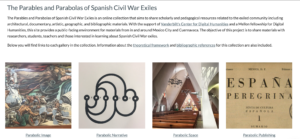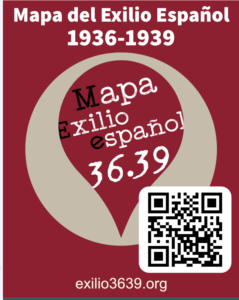As a Mellon Postdoctoral Fellow in the Digital Humanities, a Mellon Graduate Fellow in the Digital Humanities, and a HASTAC scholar, I have consistently incorporated digital methods in my research.
Exile 36-39
More than 80 years ago, artists, academics, supporters of the Republic, and others sought exile Spain’s Francoist regime. Now their stories are perishing. With each passing day, there are fewer remaining members of the exile community and the global pandemic has severely restricted travel to the cultural centers that maintain archived materials of their lives.
In this context, it was thus necessary to create a dedicated digital platform to preserve their stories. Exilio3639.org is a collaborative, public digital humanities project with the Ateneo español de México, members of the exiled community, and academics.
Using the open-source platform CGeomap, this transnational project crowdsources cultural ephemera, documents, and oral histories from the relatives of exiles, scholars, and the general public. The story map demonstrates the potential for individuals to narrate their own histories and to relate their experiences across both space and time. In addition, the project makes cultural objects and histories more engaging to a broad public audience.
Párabolas of Spanish Civil War Exiles
 The website Parábolas of Spanish Civil War Exiles is an online collection that aims to share scholarly and pedagogical resources related to the exiled community including architectural, documentary, artistic, geographic, and bibliographic materials. With the support of Vanderbilt’s Center for Digital Humanities and a Mellon fellowship for Digital Humanities, this site provides a public-facing environment for materials from in and around Mexico City and Cuernavaca. The objective of this project is to share materials with researchers, students, teachers, and those interested in learning about Spanish Civil War exiles.
The website Parábolas of Spanish Civil War Exiles is an online collection that aims to share scholarly and pedagogical resources related to the exiled community including architectural, documentary, artistic, geographic, and bibliographic materials. With the support of Vanderbilt’s Center for Digital Humanities and a Mellon fellowship for Digital Humanities, this site provides a public-facing environment for materials from in and around Mexico City and Cuernavaca. The objective of this project is to share materials with researchers, students, teachers, and those interested in learning about Spanish Civil War exiles.
Language Panda
 In 2016, my colleagues at the Center for Second Language Studies and I set out to address an emerging need in the field of foreign language teaching: As communication has taken an increasingly digital form, there is a growing emphasis on designing lessons that practice technology-based interactions. And while we are teaching in an interconnected world, lesson plans, resources, and pedagogical approaches are not widely available online. What is more, limited technical expertise may discourage instructors from engaging with digital platforms. In response to these issues, we created the website Language Panda, an online repository for digital language teaching materials and ideas.
In 2016, my colleagues at the Center for Second Language Studies and I set out to address an emerging need in the field of foreign language teaching: As communication has taken an increasingly digital form, there is a growing emphasis on designing lessons that practice technology-based interactions. And while we are teaching in an interconnected world, lesson plans, resources, and pedagogical approaches are not widely available online. What is more, limited technical expertise may discourage instructors from engaging with digital platforms. In response to these issues, we created the website Language Panda, an online repository for digital language teaching materials and ideas.
View my digital teaching projects for the Language Panda website: Digital Teaching Examples

